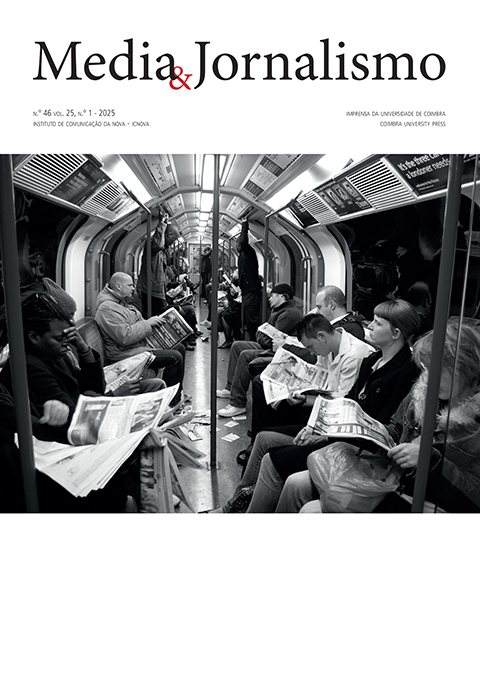A despolitização da pauta dos agrotóxicos: Análise da posição pública do governo Bolsonaro na imprensa
DOI:
https://doi.org/10.14195/2183-5462_46_2Palabras clave:
agrotóxicos, Bolsonaro, despolitização, imprensaResumen
Este artigo analisa a posição do governo de Jair Bolsonaro sobre o tema dos agrotóxicos a partir da análise da cobertura jornalística sobre o assunto desde as eleições para presidente, em outubro de 2018, até o fim do primeiro ano de mandato, em janeiro de 2020. O objetivo é explorar as dinâmicas de despolitização das questões que envolvem o campo brasileiro através dos seguintes indicadores: (a) os enquadramentos (como os discursos são organizados a partir de uma certa perspectiva); (b) as posições (como os atores são colocados em relação com outros); (c) e as estratégias de legitimação (como uma demanda particular, ação ou poder é justificado ou sancionado). Nosso foco, neste artigo, é a posição de Jair Bolsonaro, dos ex-ministros e demais membros do governo, buscando entender como a política despolitizante foi proposta e justificada e quais as estratégias de legitimação empregadas.
Descargas
Citas
ACSELRAD, H. (2001). Políticas ambientais e construção democrática. In: VIANA, G.; SILVA, M. (Orgs.). O desafio da sustentabilidade: um debate socioambiental no Brasil. Editora Fundação Perseu Abramo.
BALLESTRIN, L. (2018). O debate pós-democrático no século XXI. Revista Sul-Americana de Ciência Política, 4(2), 149-164.
BATES, S.; JENKINS, L.; AMERY, F. ( 2014). (De) politicisation and the Father's Clause parliamentary debates. Policy & Politics, 42(2), 243-258.
CELATA, F.; SANNA, V. S. (2012). The post-political ecology of protected areas: Nature, social justice and political conflicts in the Galápagos Islands. Local Environment, 17(9), 977-990.
CIOCCARI, D.; PERSICHETTI, S. (2019). A campanha eleitoral permanente de Jair Bolsonaro: O deputado, o candidato e o presidente. Lumina, 13(3),135-151.
FLINDERS, M.; BULLER, J. (2006). Depoliticisation: Principles, tactics and tools. British politics, 1(3), 293-318.
HAY, C. (2007). Why we hate politics. Polity.
JENKINS, L. (2011).The difference genealogy makes: Strategies for politicisation or how to extend capacities for autonomy. Political Studies, 59(1) 156-174.
KENIS, Anneleen; MATHIJS, Erik. Climate change and post-politics: Repoliticizing the present by imagining the future?. Geoforum, v. 52, p. 148-156, 2014.
MAESEELE, P. et al. (2015). In Flanders Fields: De/politicization and democratic debate on a GM potato field trial controversy in news media. Environmental Communication, 11(2), 166-183.
MOUFFE, C. (2005). Por um modelo agonístico de democracia. Revista de Sociologia e Política, 11-23.
MOUFFE, C.[2005]. Sobre o político. WMF Martins Fontes.
PICKERING, S. (2001). Common sense and original deviancy: News discourses and asylum seekers in Australia. Journal of Refugee Studies, 14(2), 169-186.
RANCIÈRE, J. ( 1996). O desentendimento. Editora 34.
RANCIÈRE, J. (2015). O ódio à democracia. Boitempo Editorial.
RANDERIA, S. (2007). De-politicization of Democracy and Judicialization of Politics. Theory, Culture & Society, 24(4), 38-44.
SANTOS, A.J.V. (2019). Os primeiros meses da agenda socioambiental de Jair Bolsonaro e o que esta nos diz sobre nossa ontologia. Sociologias Plurais, 5(2).
SOLANO, E. et al. (2018). O ódio como política: a reinvenção das direitas no Brasil. Boitempo Editorial.
VIMIEIRO, A. C.; MAIA, R. C. M. (2011). Análise indireta de enquadramentos da mídia: uma alternativa metodológica para a identificação de frames culturais. Revista FAMECOS: mídia, cultura e tecnologia, 18(1), 235-252.
WILSON, J.; SWYNGEDOUW, E. (2014). Seeds of Dystopia: Post-Politics and the Return of the Political. In: SWYNGEDOUW, E. e WILSON, J. The Post-Political and Its Discontents: Spaces of Depoliticisation, Spectres of Radical Politics. Edinburgh University Press.
WATSON, M.; HAY, C. (2003). The discourse of globalisation and the logic of no alternative: rendering the contingent necessary in the political economy of New Labour. Policy & politics, 31(3) 289-305.
WOOD, M.; FLINDERS, M.(2014). Rethinking depoliticisation: Beyond the governmental. Policy & Politics, 42(2), 151-170.
WOOD, M. (2016). Politicisation, depoliticisation and anti-politics: Towards a multilevel research agenda. Political Studies Review, 14(4), 521-533.
ŽIŽEK, S. (2002). For they know not what they do: Enjoyment as a political factor. London: Verso.
Descargas
Publicado
Cómo citar
Número
Sección
Licencia
Derechos de autor 2025 Media & Jornalismo

Esta obra está bajo una licencia internacional Creative Commons Atribución 4.0.
Os autores conservam os direitos de autor e concedem à revista o direito de primeira publicação, com o trabalho simultaneamente licenciado sob a Licença Creative Commons Attribution que permite a partilha do trabalho com reconhecimento da autoria e publicação inicial nesta revista.



 SciELO
SciELO

